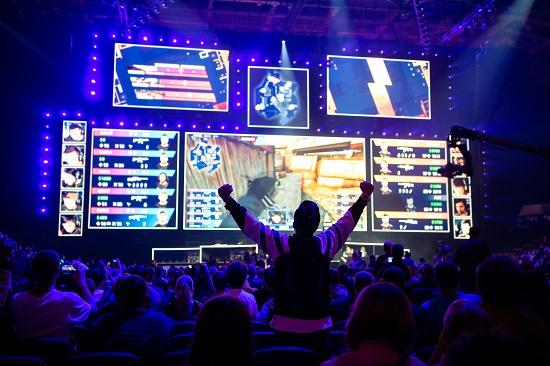

Esports, we already know, is an emerging sport, and something that bears watching. In fact, many sports fans are already watching.
A new survey by Reviews.orgindicates that while more than three-quarters of Americans 18 and older play video games, 40 percent have watched an esports event during the past year via YouTube, Twitch or other streaming services. And here’s the kicker: One in four Americans say they are more interested in esports than they are in traditional sporting events.
“Why is this all so interesting?” asks PCMag.com. “Because of money. The pro esports athletes are pulling in riches that will start to make the pro athletes on the court or on the field question whether it’s worth risking concussions and worse, when they could settle for a repetitive stress injury using a game controller.”
According to Reviews.org’s “2021 Esports Report,” the United States boasted a $20 million payout for gaming competitors in 2020. That’s more than any other country in the world. No wonder the esports market is expected to be a $1.5 billion industry in a mere two years.
Of course, esports also can be played remotely, which is a big reason for its surge.
Prior to COVID-19, an event industry was forming around esports with purpose-built venues, varsity programs at the high school and college levels, and even esports management majors. Noting that esports moved to a fully online ecosystem in 2020, the gaming and esports analytics firm Newzoo predicts esports will continue to remake the competitive landscape.
“Having taken a significant hit from the COVID-19 pandemic, traditional sports organizations will look to innovate and expand their activities in the esports space,” according to esportsobserver.com, of which Newzoo is part. “With travel still limited for the foreseeable future, 2021 will likely be another year with a greater focus on league-based play and regional competition instead of the typical year’s heavy focus on international events. This could have a long-lasting result in reshaping some esports ecosystems [that] previously followed a more travel-focused tournament schedule.”
“I think just as with every situation, certain industries thrive and others do not, and COVID … propelled us into five years ahead of where we would be in esports,” Ray Pastore, an associate professor of instructional technology and esports at the University of North Carolina Wilmington, told NBCNews.com. “We’re going to see a lot more of it as the next few years roll on.”
Organizers of traditional sports events, meanwhile, are addingesports components. The Central Intercollegiate Athletic Association, the nation’s oldest historically Black athletic conference, will include an esports tournament as part of its first-ever virtual tournamentFeb. 23-27, taking place in lieu of the CIAA Basketball Tournament. And the World Baseball Softball Confederation has established ebaseball and esoftball as formal disciplines of the sport.
And it’s not just sports fans feeling the esports buzz. As one of its trends to watch in 2021, Newzoo predicts that “gaming will energize efforts towards reducing toxicity and promoting diversity and inclusion.” Some games already have taken steps toward diversity and inclusion, and more titles than ever now feature accessibility options, thanks to the Xbox Adaptive Controller and efforts by organizations such as AbleGamers and SpecialEffect.
“Online platforms and ecosystems are also striving to make their social hubs more wholesome and less toxic,” Newzoo notes. “To that end, Microsoft, Sony, and Nintendo recently announced a collaboration committed to safer and more responsible gaming and curbing toxicity.”
“We believe gaming is for all people of all ages, including our youngest and most vulnerable players,” wrote Dave McCarthy, corporate vice president of Xbox Operations when introducing “Our Shared Commitment to Safe Gaming.” “Technology makes compelling entertainment experiences possible, and we want to ensure that those experiences – especially when they involve interaction with others – are positive and respectful. All players deserve to have fantastic social gaming experiences in settings where respect and safety are mutual.”
Additionally, some of the country’s biggest employers claim esports can increase productivity and collaboration at the office.
“More companies are realizing that competitive gaming is a meaningful activity that provides a very serious value-add,” Brad Tenenholtz, co-founder of the Corporate Esports Association (yes, that’s a thing), told The Philadelphia Inquirer.
As an example, a product manager at Walmart pointed to something as basic as writing an email. “I’ve seen people spend more than 30 minutes drafting a simple work email,” Joshua Rowell, who established the retailing giant’s internal esports force, told the paper. “But when you’re in the middle of playing Overwatch or League of Legends, you don’t have time to sit back and think, ‘Hmm, am I being too flowery with this message?’ So esports actually teaches you to be respectful while still being concise.”
He also said he’s recommended employees for promotions based on their gaming skills: “These individuals were great at directing people in a game, but they never thought to apply those same principles to their jobs. We were able to reach out and show them how they can carry those skills over to their day-to-day.”
Another noteworthy development is the IOC's announcement that it has voted to establish closer ties with esports. However, it noted, it will continue to eschew violent games in favor of those based on true sports.

